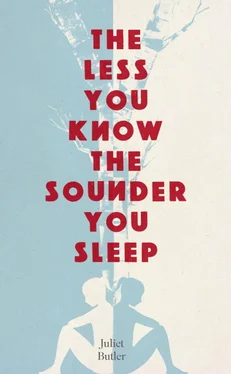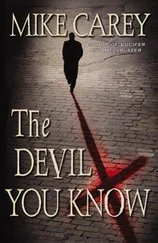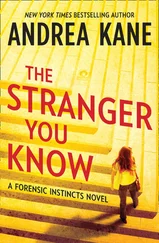I want to stop thinking and turn over, but I can’t. I can never turn over.
Why, why, why did we have to be born Together?
I look up at the black ceiling, and try really hard to stop thinking. I want a glass of water, but I can’t get up because Masha’s asleep. I could get up, but she’d be angry. And I can’t make her angry. Stand up for yourself . That’s what he said. I want a drink so badly. Vodka. I’m all jittery, I can’t stop twitching. If I’d stood up for myself, then I could have stayed at the school for another year. And then gone to the village. I could have spent those last few years with him. I might even have had my Lyuba and Marat with him. How do I know we were sterilized? I don’t. And I could have done all those things if I wasn’t Together.
Masha stirs in her sleep and I feel like hitting her. No. I couldn’t stand up to her, I just couldn’t. I still can’t. I can’t even bring myself to wake her up to get a glass of water. Asking me to change and be strong is like asking me to look at rail tracks set in cement and tear them up by willpower alone. It’s not possible. We were born like this, we’ve lived forty-five years like this. How does Olessya think I can get Masha to compromise, as though it’s as easy as flicking a light switch? Besides, what’s the point?
Stop! Stop thinking!
I thump the bed and she stirs again. What’s the point of regrets? Tears pour salt on a wound. Masha was strong, Masha got us to the school in the first place. She got us into the Twentieth, and she got us here.
Stop thinking!
I squeeze my eyes closed and take a deep breath. I need to disappear into my world of fantasy in the village, the log cabin, the stove… yes, get up, put wood on the stove… Slava going out to the meadow. But wait, that’s why he couldn’t come and stay with us at the Twentieth, wasn’t it? Because his body was slowly crushing him to death. He needed his family doctor and pain control and medical care… more than he needed me? I would just have been his carer.
Sleep, oh please, let me sleep… Gospodi , I need a drink. Vodka is the only thing that makes everything go away. Vodka is that delightful, black, ink-out paint that stops everything hurting. Vodka gives me black, dreamless sleep. Like death… like beautiful suicide.
‘Up we get then, rise and shine. Greet the new day!’
I must have fallen asleep eventually.
Masha’s pulling me off the bed. ‘Put the kettle on, come on, get a move on. Mashinka wants her sweet glass of tea, and what Mashinka wants, Mashinka gets.’
I asked her, after Joolka had gone, if we could call Anyootka. We were sitting on the sofa, tying the laces on our boots before going down to the entrance hall to talk to Baba Iskra in the cloakroom. ‘Just to chat about old times,’ I’d said. ‘It would be nice. She might even know where Slava’s parents are.’ Masha stood, and picked up our bunch of keys. ‘I don’t need your precious Anyootka and her tearing-them-in-two talk.’ We walked through the corridor to the door. ‘She never liked me anyway. And I bet all that sister stuff was rubbish. She fancied him, anyone could see that. She wanted to take him away from you, and now you want to get back in touch. Foo! ’ She opened the door and we walked out. ‘Please, Masha, just one call.’ She closed the door with a bang and I knew what that meant: Nyet .
We’ve put a Modern Talking tape on and Masha’s boogeying to the music while I’m getting our breakfast out of the fridge when Joolka comes in, looking nervous again. She kisses us both on the tops of our heads, like she does.
‘I swear, I’m never going to be able to listen to Modern Talking without thinking of you two,’ she says with a smile as we all walk over to our bed. She sits next to Masha instead of on the floor. That’s odd.
Masha’s pleased though. ‘See? You can’t get enough of me, can you, Maht ? You want Mashinka’s kisses.’
‘Bites, more like – I’ve hardly got any ear left after yesterday.’
They laugh.
‘So, here are the printouts in Russian of Vera Stepanovna and Anyootka’s interviews. One for you, Masha, and one for Dasha.’ She bites her lip and won’t look at us. ‘Here, read it and tell me what you think as you go through it. I’d like your reaction.’
Joolka gets up and puts the papers next to me on the bed, then sits back down with Masha. I pick them up and start reading. But I don’t understand. It’s not the interviews at all. It says in small type at the top: Psychological Assessment by Doctor Johann Weber, Cologne. He’s the psychiatrist we met in Germany. I look up at Joolka questioningly, but she shakes her head quickly at me. Masha’s got her nose in her own papers.
I look back down at the assessment.
Having studied Maria and Daria Krivoshlyapova, a pair of ischiopagus tripus twins, my diagnosis is that Maria (‘Masha’) displays all the character traits typical of primary psychopathy – a stunted paralimbic system present from birth, which also entails disorders in…
I put it down. I shouldn’t be reading this. It’s disloyal, it’s deceitful; we have no secrets, me and Masha. But yes, yes we do. Slava’s secret. I pick it back up again. Masha would kill us both if she knew I was reading this.
Primary psychopathy is a deeply ingrained constellation of personality traits and behaviours, the symptoms of which reflect an emotional processing disorder, with a strong genetic foundation. This might seem extraordinary, given that these twins are genetically identical, but I believe that, somehow, ‘genetic memory’ is at work here. From conversations with the twins it appears that their father may well have had psychopathic tendencies and their mother may have been clinically depressed.
‘Haha! See?’ exclaims Masha. I jump, but she’s pointing at her printout. ‘Seems Vera Stepanovna did like me after all. See?’
Joolka laughs too. ‘Of course she did, Masha. Who wouldn’t like you?’
‘Look,’ she goes on, cackling, ‘look – she says I was a bit of a monkey, but that I was one of the most popular kids in school. She says I made everyone laugh. You can put that in the book.’
‘Yes, and see what it says here…’ says Joolka, and they lean in over the papers with their heads together. I’m still reading mine. My heart’s beating fast. I hope Masha doesn’t notice. Psychopath? Masha? A medically certified psychopath? I remember Lydia Mikhailovna calling her that when we were hiding under the desk in SNIP. And Slava called her a psychopath once, but it was just a throwaway word and he only meant she was a bit… controlling. And cruel. Didn’t he?
The vast symptoms of the condition of primary psychopathy exhibited by Masha include the following traits: superficial charm and wit; lack of empathy; callousness; manipulation; pathological lying; arrogance; blame shifting; total control of a partner; persistent devaluation of a partner; aggression/violence; impulsivity; parasitic lifestyle; lack of anxiety but angers easily…
It’s all Masha. Every single one.
She’s laughing at something Vera Stepanovna said about how we balanced each other out perfectly. How Masha was tough and I was soft. How Masha always had a big smile on her face and how I was more thoughtful. How Masha supported me through difficult times…
‘See?’ says Masha, looking across at me. ‘Have you got to that bit?’ I nod and smile, then look back down quickly, leaning slightly away from her.
From my brief interaction with the twins it became clear that Masha displayed every symptom of primary psychopathy. And Dasha, with her suicidal tendencies and persistently bleak outlook on life, displayed symptoms of clinical depression. She was less vocal and therefore less accessible for superficial diagnosis. Depression can be treated by medication, psychopathy cannot.
Читать дальше
Конец ознакомительного отрывка
Купить книгу












